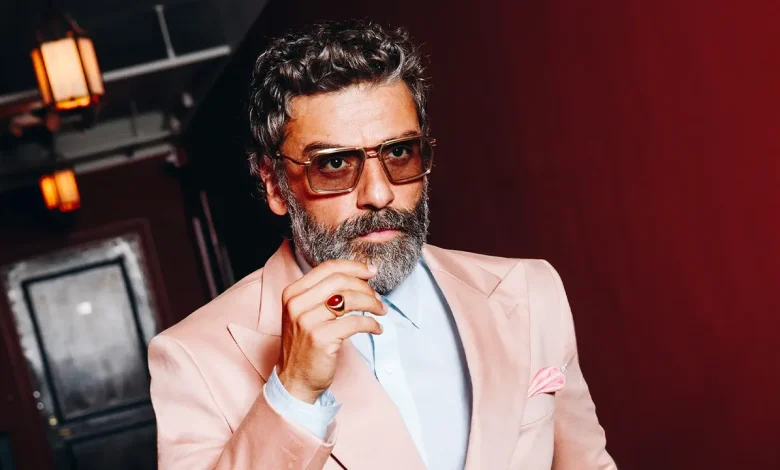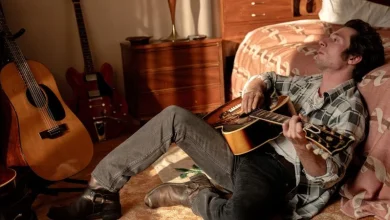How Oscar Isaac Made Frankenstein New Again

Tank top by Louis Vuitton Men’s. Pants by Celine. Belt by Artemas Quibble. His own necklace (throughout) by Cartier.
In any given Frankenstein movie (there have been hundreds of them since the first film based on Mary Shelley’s novel opened in 1910) the plum role is usually the creature. He’s the one who learns to feel, who discovers man’s inhumanity, who makes us cry. His creator, on the other hand, is typically just a means to an end—the ethically sketchy guy who throws the switch and says: It’s alive!—and with all due respect to Sting, Udo Kier, Raul Julia, and every other legendary actor who’s played the role over the years, just about the only Dr. Frankenstein anybody remembers is Gene Wilder’s. (“It’s pronounced Frahn-ken-steen.”)
In Guillermo del Toro’s Frankenstein, Jacob Elordi does transformative work as the creature, whose ennobled suffering gives this most Catholic of Frankenstein adaptations its broken heart. But the movie’s fevered energy, particularly in the first half, comes courtesy of Oscar Isaac, whose Victor Frankenstein has a madman’s eyes, a front man’s strut, and family-of-origin issues so serious Freud would choke on his Raisinets. “I think our version, this Victor, has a lot of rage in him,” Isaac says. “Defiance was a word we used a lot—a lot of addicts, that’s one of the main things they have. Defiance against circumstances, against themselves, against their past. So the fun thing with Victor is I played him like an addict, even though the only thing you see him ingest is milk, as a way to get Mom’s milk back.”
GQ: This was a bucket list project for Guillermo—the film he’s been wanting to make since before he started making films. How did he pitch it to you?
Oscar Isaac: I went to his house, just to meet. We sat in his kitchen and ordered take-out Cuban food, and we’re sitting there eating rice and beans and pork, and we just started talking about our fathers. We started talking about our dads, and the pain and the joy and forgiveness, and becoming fathers ourselves and what’s inherited, as far as pain and trauma. And how one moves forward in relation to that kind of a past and either trying to run away from it or trying to fix it or change it or holding onto a lot of these resentments. And at the end of that conversation, he said, “I’m making Frankenstein, and I think you need to play Victor.”
And I said, “You’re doing what?” He’s like, “It’s this thing I’ve always wanted to make, and I just think that you need to be Victor.” And so of course it was an incredible moment, but I was protective of getting too excited. I’m like, Maybe he’s just having an aneurysm right now, or who knows—maybe he just says that to everybody, that’s like his pickup line. And then within a few months he was writing pages. And within a year—well, at first he gave me Mary Shelley’s Frankenstein when I left. And the Tao Te Ching. And he was like, “These are the two books you need to read.” And then we kept talking, and then within a year he had the whole beginning and the end and then descriptions of a lot of the middle. And we got together in New York, and we sat down and I read basically all the parts and he just watched and listened. And particularly the ending, which is so much about how do you move forward with a broken heart and how do you forgive? We were both just in tears. And then it started to feel real.
In what way is this a Taoist Frankenstein, do you think?
Well, I think Guillermo’s kind of a Taoist filmmaker. It was interesting. A lot of it is a bit of a God’s-eye view of the world and of reality. There’s a circularity to it. There is, even in all of the ugliness and the darkness, there is this kind of benign awareness that ultimately there is a loving universe underneath all of the pain that can be accessed. And so I think that’s where he approaches [the Frankenstein story], as horrible as it is, as archetypal as it is—because it is a heightened expression of these Jungian type of shadow psyches that are very broken. And so you’re delving inward, to tell this really big story. It was unlike anything I’ve ever done.
So you had the heaviest possible conversation, over Cuban food, before the name “Frankenstein” was even mentioned.
We did. But Guillermo is such an incredibly joyful person. And the set was joyful. We were laughing all the time. He basically directed me in dirty jokes, and we only spoke in Spanish to each other. I think because there was so much joy and lightness, we were able to go full tilt with the darkness as well.
It’s an emotional Mexican melodrama that we made. This is a very European story told in an extremely Latin point of view. At one point I was like, “That is a lot, man. Is this too much?” And he is like, “Look, cabrón, it is not an accident that my Victor’s real name is Oscar Isaac Hernández.”
When you’re coming up with a performance, do you like to start with an idea and move toward something physical and tactile, or do you like to go the other way?
I think I try to listen to what the story is or what the project is. So I don’t have a very strict way that I get into it. I’m also pretty gullible, so it’s easy for me to buy into stuff. Maybe that’s because of a religious upbringing where it was like: You have to believe. So there’s a fear of not believing, like, I’ve got to believe this. Even if I have doubts. It’s like, There’s no other choice. I’ll go to hell otherwise. And that’s how I approach scripts!





